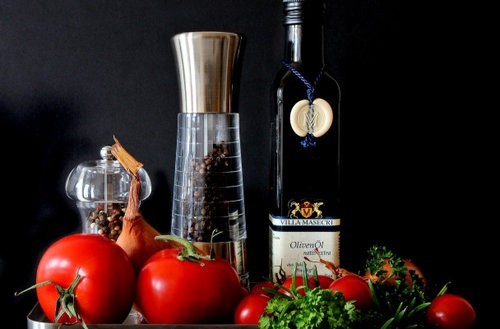Can a specific food or diet help my macular degeneration from getting worse?
Hogg, R. E., Woodside, J. V., Mcgrath, A., Young, I. S., Vioque, J. L., Chakravarthy, U., . . . Fletcher, A. E. (2016). Mediterranean Diet Score and Its Association with Age-Related Macular Degeneration. Ophthalmology. doi:10.1016/j.ophtha.2016.09.019
This recently published study reminded me of how diet can influence the progression of macular degeneration (AMD), and it also made me think twice about the soda I was drinking at the time. Patients often ask me what vitamins or supplements I recommend to help prevent the vision loss that can occur in macular degeneration. This study looked at 5060 randomly selected people, aged 65 or older from 7 different countries in Europe (Norway, Estonia, United Kingdom, France, Italy, Greece, and Spain).
Macular degeneration is a complex eye disease with numerous contributing factors- some of these include age, genetics, environment, smoking, degree of pigmentation, sunlight exposure, and diet. We know that high-dose multivitamin supplements can help prevent the progression of AMD. I recommend the AREDS2 (Age-Related Eye Disease Study) formulation of vitamins to all my patients along with a standard multivitamin. It is well recognized among doctors (and patients) that a diet high in antioxidants can have numerous beneficial effects on one’s health. These benefits are hard to hash out in clinical studies, as dietary patterns are so different from person-to-person and country-to-country. This was a nice study as it enrolled people from many countries and with widely different cultural diets.
Participants in the study took a questionnaire about their habitual consumption of foods including variety and portion size. Each patient was given a score (ranging from 0-9) based on their consumption of key foods. They got points for certain food goals (shown below). The key foods were part of a Mediterranean diet which is inspired by the eating habits of people from Italy, Spain, and Greece. This diet is high in olive oil, legumes, fruits, vegetables, wine, and fish. The diet is low in red meat and heavily processed carbohydrates. There has been evidence that it lowers the risk of heart disease.
Important note: Remember this list as it gives some good dietary goals for you to follow.
Eat more:
≥ 1 spoon/day of olive oil
≥ 1 glass of wine per day
≥ 1 serving of fruit/day
≥ 1 serving of vegetables or salad/day
≥ 3 servings of fish/week
≥ 2 servings of legumes/week
≥ 5 servings of whole-grain bread/week
+ extra point given if daily serving of both fruits and vegetables
Eat less:
≤ 1 serving of meat/day
≤ 1 serving of rice/day
≤ 1 serving of white bread/day
Each patient then had color retinal photographs taken and sent to a reading center for evaluation. This was a feature of the study that was nice – the person reading the photo had no idea about the dietary patterns of the person in the picture, hence eliminating bias. The photograph was given a grade of 0, 1, 2, 3, or 4. As the number increased, so did the degree of severity of the macular degeneration. Grade 4 were patients with “wet” macular degeneration or geographic atrophy. Both are bad and can cause severe vision loss. Many patients with “wet” macular degeneration require injections of medications like Avastin, Eylea, or Lucentis into the eye to reduce the risks of severe vision loss. “Wet” denotes the presence of scar, blood, or fluid under the retina due to abnormal blood vessel growth. “Geographic atrophy” are patches of thin retina where vision can be very poor. Blood samples were also collected and sent to test for antioxidants like retinol, beta-carotene, lutein, zeaxanthin, and lycopene.
The results of the study showed that increased adherence to a Mediterranean Diet was associated with reduced odds of having “wet” macular degeneration. Scoring a 6 or more (remember the goals above) was associated with about a 50% reduction in odds ratio of developing “wet” macular degeneration compared to those scoring ≤ 4.
I think the results of this study will make my wife and I think twice about our habitual “Friday Burger Night.” I plan to mention this study to my patients looking to adopt dietary changes after being diagnosed with macular degeneration.
All the best,
Chris Stelton MD

